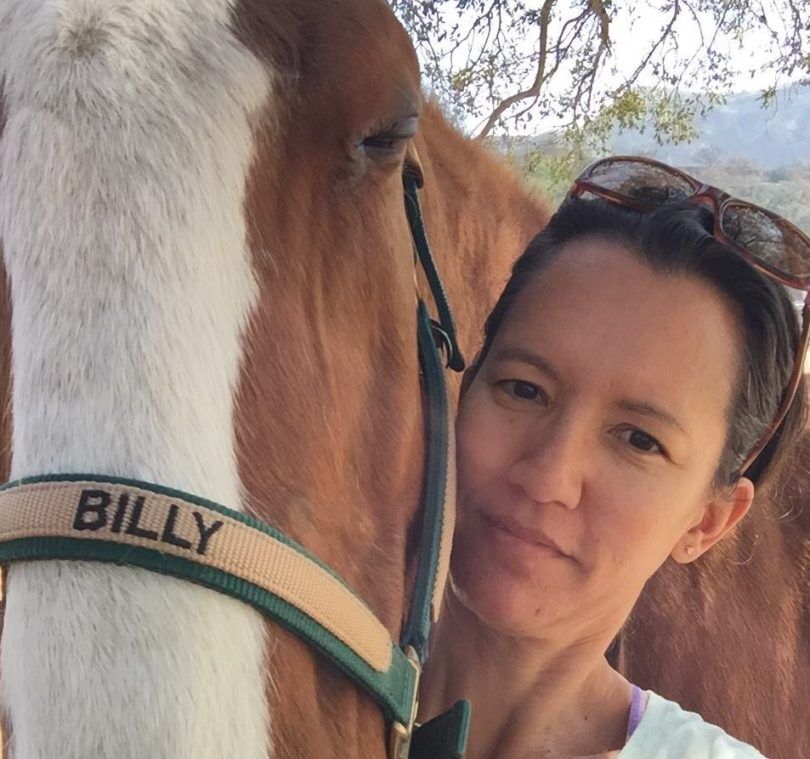Short answer: Yes! Longer answer: It’s not age that matters most, it’s your level of fitness and willingness to learn.
Bottom line: You CAN learn to ride a horse at any age, provided you have the physical fitness and mental acuity to develop the necessary skills and do so safely.
Fortunately, there are equestrians enthusiastically trotting along at all levels of skill and at all ages to inspire you. There are also plenty of great books and equestrian podcasts and vloggers that can help you prepare in your free time.
In this article, we’ll talk about what horseback riding requires and how you can feel prepared before you head off to the stables.
*Photo provided by Angie Misaghi (@angisaghi)
A Few Things to Keep in Mind
Riding is surprisingly active
Compared to some other sports, riding might seem to be a pretty passive way to get outside and move around. After all, your horse is doing most of the work, right?
Turns out, even if you’re not helping out around the barn with weightier activities, such as hauling hay bales or cleaning stalls, you’ll still use all kinds of muscles in the saddle. This is true even at beginner levels.
To help you imagine this, think of yourself sitting in a rolling desk chair. They’re easy to move around — just a little kick here, and a push there, and you’re zooming across the floor.
You’re in control of the movement.
Now, imagine someone has crept up behind you and has started pushing the chair along for you. She pushes you down the hallway, zigging and zagging, speeding up and slowing down as she pleases.
Even if she’s not pushing you too fast, you’re still going to tense up as you try to anticipate her next move and keep your balance.
Yep, that’s riding!
You’re going to be using muscles that haven’t been awake for years, in some cases. And, as you get stronger in your skills, you’ll be using your body to better control your horse, coordinate your moves with theirs, keep your balance at faster speeds, and maintain leg and seat pressure.
Your core muscles, back, and even lower legs will be doing a lot of work.
But… you’ll get STRONG!
If you’re looking for a really fun way to build leg strength, abdominal muscles, a powerful upper body, and flexibility, horse riding is fantastic.
Just be prepared for the initial soreness, if you haven’t been getting much physical activity.
If possible, start with some light cardio work 2-3 times a week for at least 30 minutes, and lifting light weights can be very helpful.
We’re also big fans of the benefits that yoga can bring into a riding fitness program — it increases strength, balance, and flexibility. Check out our 5 yoga poses for equestrians to get started.
Talk to a pro about your readiness
Before you sign up for a group lesson or private lesson, find out which nearby lesson barn or riding school offers adult beginner classes.
Schedule time to talk to a riding instructor before signing up for a riding lesson. He or she will be able to help assess your fitness and any riding experience you have, soothe your mind by answering any questions, and go over what you’ll need to bring/wear for your first lessons.
If you’re worried about getting up into the saddle, for example, mounting blocks make the process much simpler. Discuss any potential issues you might have (joint replacement, reduced range of motion, etc.) with the instructor so you can be properly prepared and ride safely.
Feeling a little nervous about your new hobby? Check out 32 Things You Can Do Now to Calm Your Riding Nerves Forever.
Once you’ve gone over any limitations that need to be addressed, you’re ready to get started!
P.S. Enjoy this article? Trot on over to:
- 13 Best Horseback Riding Boots for Lessons
- What gear do you need to ride horses as an adult?
- How to Ride a Horse for Beginners (Basics, Safety, Mistakes)
- What to Wear Horseback Riding (With Pictures)
- When is it Too Late to Learn to Ride a Horse?
- Meet 3 of the Best Horse Breeds for Older Riders
- When Should You Start Horseback Riding Lessons?
- Do You Ever Forget How to Ride a Horse?
- Learning to Ride a Horse in Your 20s
- Learning to Ride a Horse in Your 30s
- Learning to Ride a Horse in Your 40s
- Learning to Ride a Horse in Your 50s
- Learning to Ride a Horse in Your 60s
- 6 Best Horse Riding Body Protectors for Unplanned Dismounts
- Hit Air Equestrian Vest Review: My Favorite Fall in 30 Years
